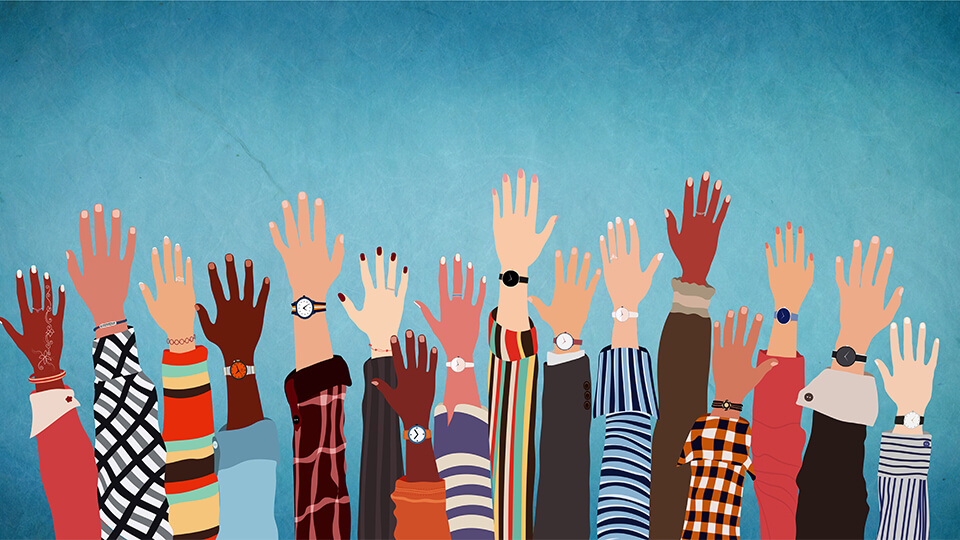Sue Johnson, Managing Partner Inclusion & Diversity Consulting Practice, shares her thoughts on microaggressions toward people of color in the workplace, and steps on how to be an ally when you see these happening.
Preparing for a training session on microaggressions, I was running through the content with a colleague Nadine (name changed), and she shared how someone had asked “Can I touch your hair – it looks fabulous?”
Nadine is Black and periodically would come into work with a fabulous new hairstyle. (I only get to discuss length and color, the braiding options seem endless to an uneducated and envious eye!) Following this, Nadine asked how I would feel if someone wanted to touch my hair, or even worse, someone just come up and do it, then question “is it your hair??! (she responded, yes, because I paid for it….). She then turned her attention to my holiday in America, questioning how many times I had been followed to the till by security guards. I looked blankly at her, and she explained how she was routinely followed by security guards due to the color of her skin.
Microaggressions “The everyday slights, indignities, put-downs and insults that People of Color… experience in their day-to-day interactions with people” (Derald W Sue, Psychologist, 2020), are verbal or non-verbal snubs, and can take the form of clumsy jokes, ill thought through mannerisms, jarring comments, and frequently are intended to be a compliment, however, end up having a harmful and long-lasting impact.
Microaggressions tend to be towards groups of people (not in the dominant group), happen multiple times through the day and can impact the mental health and well-being of the receiving group, by:
- Making people feel invalidated (when you hear “where are you from, no…. where are you really from”
- Feeling like they are not truly heard or understood
- Covering, where individuals have to hide an element of themselves in order to fit in and be successful, for People of Color this could mean hiding their heritage, accent, communication style, and eating preferences, and is exhausting on a daily basis.
I am of British White ethnicity, and invariably in the ethnic majority where I live and work, to be honest, my ethnicity is not something I ever really think about. Over the years I have become attuned to gender microaggressions, and how to deal with them. However, when I heard Nadine’s lived experiences, I realized how I was not recognizing microaggressions against People of Color.
I reflected on my training courses and how I/We/YOU can be an effective White ally, using any or all of the following 5S’s:
- Sponsor – Visibly and vocally support people of color. For example, when reviewing a team proposal for a project or nominations to attend a conference, speak up and say “how about Nadine, she has demonstrated the skills required for this project in X, or as a future leader will gain Y from attending the conference” if they have been overlooked.
- Student – Constantly educate yourself on the topic, always bring new research and insight to the debate. For example “I read a CIPD article last week revealing that People of Color employees are more likely than white British employees to say that their career progression to date has failed to meet their expectation.” Is this true of our organization? what can we do to explore and act on this knowledge?
- Support – Be available to support and listen to colleagues in a safe environment. Where they will never hear you say “I’m sure they didn’t mean anything by that comment” or “I’m sure you misheard”.
- Strengthen – Amplify and strengthen the voices of People of Color to ensure they have a seat at the table and are heard. For example, when someone makes a great contribution and it is not recognized, in the meeting say “building on the excellent idea by X, how about….”
- Speak UP – When you witness/hear something, speak up in the moment. For example, when a colleague goes and touches an individual's hair without asking permission, speak up that it’s disrespectful to invade someone’s personal space, how would they feel if that happened to them or their partner?
I truly believe Inclusion leads to higher personal and organizational performance, and over the past decade have trained over 10,000 leaders across multiple industries about this. I hope I’ve become a bit of an expert, yet I still get it wrong, not intentionally, but that’s irrelevant, it’s about how you make people feel.
What I’ve learned is the most important thing you can do as a white ally is do something, anything.
Silence is not an option when your friends and colleagues are on the receiving end of a microaggression. When you don’t get it quite right, immediately apologize, reflect and research what you will do differently next time.
And finally… it’s not a microaggression to tell someone how fabulous their hairstyle is, let’s just leave it at that!
To find out more about allyship, or start up a conversation, please get in touch with Sue Johnson, Managing Partner, Inclusion & Diversity Consulting Practice, or your local Odgers Berndtson contact.
Stay up to date: Sign up here for our newsletter OBSERVE, and receive the latest news in leadership and top talent, industry insights, and events directly to your inbox.



